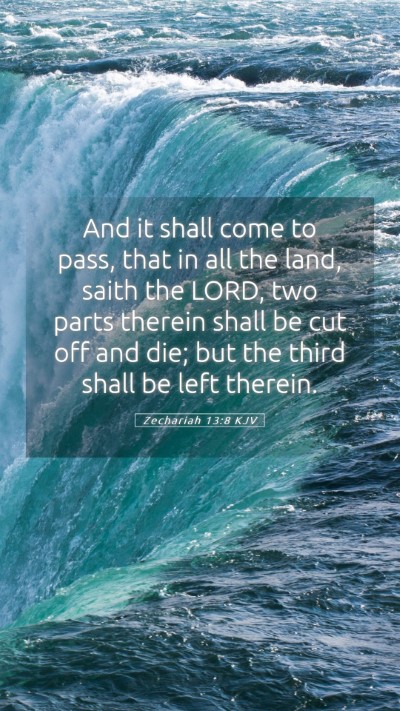Old Testament
Genesis Exodus Leviticus Numbers Deuteronomy Joshua Judges Ruth 1 Samuel 2 Samuel 1 Kings 2 Kings 1 Chronicles 2 Chronicles Ezra Nehemiah Esther Job Psalms Proverbs Ecclesiastes Song of Solomon Isaiah Jeremiah Lamentations Ezekiel Daniel Hosea Joel Amos Obadiah Jonah Micah Nahum Habakkuk Zephaniah Haggai Zechariah MalachiZechariah 13:8 Meaning
What is the meaning of Zechariah 13:8?
And it shall come to pass, that in all the land, saith the LORD, two parts therein shall be cut off and die; but the third shall be left therein.
Zechariah 13:8 Bible Verse Meaning
Understanding Zechariah 13:8 - A Comprehensive Bible Verse Commentary
Zechariah 13:8 states: "And it shall come to pass, that in all the land, saith the Lord, two parts therein shall be cut off and die; but the third shall be left therein."
This verse falls within a prophetic context that signifies a period of judgment and purification for the people of Israel. The prophetic messages contained in Zechariah are rooted deeply in the historical and social context of post-exilic Israel. The insights from various public domain commentaries provide a multifaceted understanding of this passage.
Summary of Key Themes
- Judgment and Purification: The initial part of the verse speaks to a severe judgment where two-thirds of the people are said to perish. This suggests a process of divine purification, emphasizing the seriousness of sin and the consequences that follow.
- Remnant Theology: The mention of a surviving third is significant in biblical texts. It reflects the concept of a remnant, God's preservation of a faithful group that will ultimately restore Israel.
- Hope Amidst Judgment: While the judgment appears harsh, the survival of the third provides a glimmer of hope, indicating God’s enduring mercy and plan for redemption.
Bible Verse Interpretations
According to Matthew Henry, this verse serves as a reminder of God’s purifying process, where He refines His people much like silver is refined, allowing the faithful to arise from amidst the trials and tribulations. This purification is not only punitive but also restorative.
Albert Barnes emphasizes the prophetic nature of this verse, linking it to the historical context of the Jewish people during and after the Babylonian exile. He elaborates on the idea that this prophecy reveals the consequences of rejecting God, yet simultaneously points to the grace afforded to the remnant.
Adam Clarke provides an exegesis that highlights the symbolic nature of numbers in biblical texts. He interprets the two-thirds as a metaphor for judgment upon unfaithfulness, while the one-third left symbolizes hope and God's fidelity to His covenant.
Understanding Scripture: Key Components
When exploring the understanding of Zechariah 13:8, several aspects should be considered, including:
- Historical Context: Understanding the historical backdrop enhances comprehension. This verse reflects the tumultuous times during the return from Babylonian captivity when moral and spiritual corruption were rampant.
- Symbolism: Numbers utilized in Scripture often bear symbolic meanings. The division of the people into thirds can serve as an allegory for judgment versus salvation.
- Theological Implications: The implications regarding salvation, judgment, and the remnant of God’s people offer rich material for theological reflection and study.
In-depth Bible Verse Analysis
Engaging in an in-depth analysis of this verse reveals layers of meaning and application. The two-thirds cut off can be reflective of spiritual death that accompanies a life void of God’s presence and guidance.
The one-third remnant signifies those who remain faithful amidst adversity. This remnant is cherished by God and is pivotal in the unfolding of God's redemptive plan for humanity.
Application of Zechariah 13:8
Understanding the practical application of Bible verses is essential for living out faith in daily life. The themes presented in Zechariah 13:8 offer insights into God’s nature, His judgment, the importance of a faithful remnant, and His promise of restoration.
- Personal Reflection: Believers are encouraged to reflect on personal faith and community righteousness, recognizing the necessity of integrity and commitment to God's covenant.
- Community Response: This verse invites communities to engage in reflection and repentance, fostering an environment conducive to spiritual rejuvenation.
- Hope in God's Promise: Despite judgments that may occur, individuals can find hope in the promise of God’s continued engagement with His people, emphasizing restoration over destruction.
Conclusion and Related Bible Cross References
Zechariah 13:8 serves as a profound reminder of God’s justice and mercy. It highlights the balance between righteous judgment and the promise of salvation. To further understand and deepen your Bible study, consider the following related passages:
- Isaiah 10:20-22: Discusses the remnant of Israel.
- Romans 11:5: Mentions a remnant according to the election of grace.
- Revelation 3:4: Talks about those who have not soiled their garments and will walk with the Lord in white.
This exploration of Zechariah 13:8 provides a comprehensive view of the meaning of this Bible verse, integrating various commentaries for a holistic understanding that can be beneficial for Bible study groups, personal devotionals, and theological reflection.


